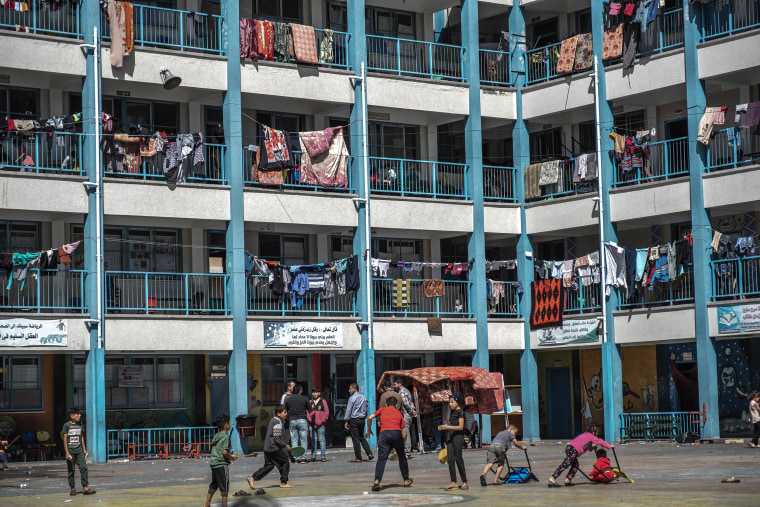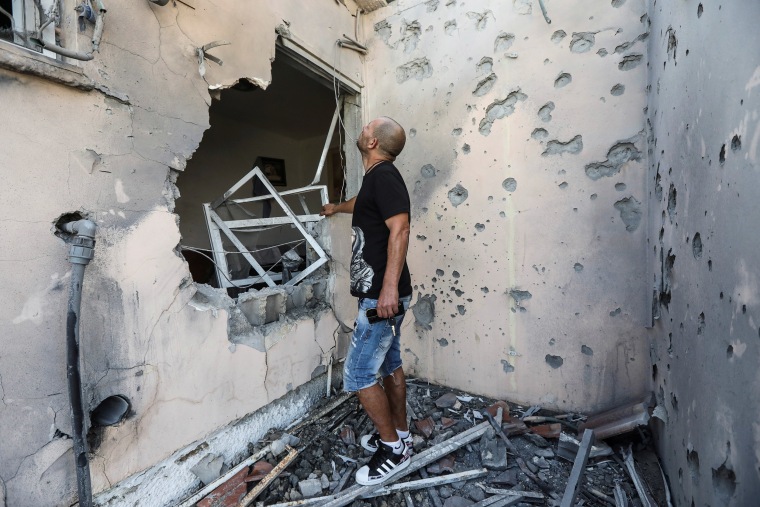World awaits cease-fire as Israel, Gaza count cost of conflict

Despite a growing sense that a cease-fire could be imminent and pressure from Washington to de-escalate, Israel launched a fresh wave of airstrikes across the Gaza Strip early Thursday
Momentum continued to build for a cease-fire on Thursday after more than 10 days of violence between Israel and Gaza that has left hundreds of Palestinians dead, thousands seeking shelter from aerial attacks and the world anxious to end the conflict.
Despite a growing sense that a cease-fire could be imminent and pressure from Washington to de-escalate, Israel launched a fresh wave of airstrikes across the Gaza Strip early Thursday while rocket attacks from Palestinian militant group Hamas resumed after an overnight lull of around eight hours.
Hamas, which governs the Gaza Strip and is labeled a terror group by Israel and the United States, has fired some 4070 rockets at Israeli territory as of Thursday, according to the Israel Defense Forces.
The vast majority have been intercepted by the country’s air defense system, but they have also killed 12 Israelis — including two children — and left residents fromthe border city of Ashkelon to bustling Tel Aviv scrambling for safety.
The Israeli military said it struck at least four homes of Hamas commanders on Thursday as it continued to target the group’s “military infrastructure,” as well as tunnels and underground rocket launchers.
But its bombardment of Gaza has killed 227 Palestinians — among them 64 children — according to the Gaza Ministry of Health, and left the already-impoverished enclave reeling.
It has also tested Israel’s relationship with its closest ally, the United States.

Prime Minister Benjamin Netanyahu vowed to press on with the offensive on Wednesday despite President Joe Biden stepping up the pressure for it to wind down.
“I am determined to continue this operation until its objective is achieved: to restore quiet and security to you, citizens of Israel,” Netanyahu said in a statement after the two leaders spoke by phone, with Biden urging a “significant de-escalation” of violence “on the path to a cease-fire.”
Biden had previously avoided pressing Israel so directly and publicly but criticism, much of it from within his own Democratic Party, has been building for him to intervene more forcefully.
The U.S. gives Israel $3.8 billion a year in military aid, equivalent to 20 percent of Israel’s defense budget and nearly three-fifths of U.S. foreign military financing globally.
Diplomatic efforts have also continued with countries such as Egypt, France and Qatar pushing for a truce.
Efforts have been stepped up at the United Nations, despite the U.S. repeatedly blocking a statement by the U.N. Security Council calling for an end to “the crisis related to Gaza” and for the protection of civilians.
The U.N. General Assembly was due to meet on the conflict on Thursday.
For many on the ground the urgency of an end to the fighting was clear.
In Gaza, a densely-populated strip of land that is home to about 2 million people, civilians continued to feel the impact of the conflict.
Already reeling from an economic blockade and the Covid-19 pandemic, the latest outbreak of violence has overwhelmed its health system and plunged its residents further into hardship.
Medicines, clean water and fuel for electricity are also running low in the territory, according to aid groups, which have warned Israeli airstrikes have further damaged its crumbling infrastructure.
“It’s difficult to work in these serious conditions as danger is present all of the time,” Marram Shehadeh, a doctor at Gaza’s Dar Al-Shifa hospital, told NBC News.
Shehadeh, 26, said she was working away from her family for days at a time and was fearful for her own safety.
“Previously we just felt that hospitals or any health facilities were safe for us. Now, I work under stress that at any time I may bombed here or near the hospital,” she said.
Tens of thousands of Gazans have been displaced and hundreds of buildings — including homes, hospitals and schools — have been damaged or destroyed, according to U.N. agency officials on the ground.
For those who remain, life is a struggle.
“It’s not easy to be a father in Gaza during the bombing,” Fadi Ali Abushammala, a Palestinian dad of three boys aged between 3 and 11 in the Khan Yunis area, told NBC News.
Abushammala, 37, said his family lived with just two hours of daily electricity while outside “everywhere you walk in the street, you will smell the death, you will smell the fear.”
The continued shelling and strikes left the children “looking at your eyes and they are asking you for protection, while at the same time, we need this protection,” he said.
The trauma of the conflict has wiped away the joys of family life, he added.
“I used to conduct some activities with the kids. We paint together, we play together, we do games, we watch fun cartoons but unfortunately the sound of the bombs and the sound of the rockets are louder than my efforts to help my kids.”
In Israel too, patients and health workers are suffering.

In the city of Ashkelon, near the Gaza border, Dr. Jonathan Rieck has been forced to move underground to treat his emergency room patients in a bomb shelter, he told NBC News.
“It’s far more challenging. It’s far more intense. We’re seeing more injured trauma, we’re seeing a lot more cases of anxiety response,” said Rieck, the director of the Emergency Medicine Department at Ashkelon’s Barzilai Medical Center.
Having witnessed various escalations in violence with Hamas over the years, Rieck said medical colleagues were “realizing that each time they’re getting better with their missiles and with the ordinance, so you’ve got to be well protected,” he added.
Despite the fear, he found solace in the work’s importance.
“Obviously, it’s not easy,” he said.




